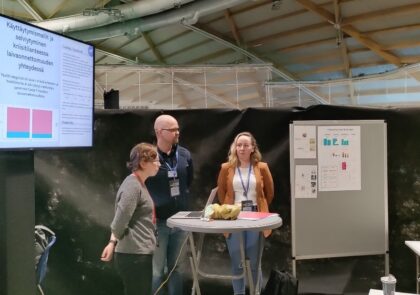
CECI project invited citizens to develop circular and sharing economy solutions for citizens in the Päijät-Häme region. This article concludes the second part of the two-part sharing economy hackathon. Describing the creative process of the workshop and outcome of the Hackathon with detailed information on the four sharing economy concepts developed together with the participating citizens.
Author: Anna Svartström
The first part of the hackathon had more than 40 listeners whom were lectured about the possibilities of sharing economy in the present and the future. The second part of the hackathon took place in the form of a three-hour workshop in the spring 2021, facilitated by Demos Helsinki, with 27 active participants.
The goal of the hackathon was to explore and build new practical business opportunities to match the growing need for sharing economy practices in the Päijät-Häme region. The hackathon started with a brief recap informing of the principles of the sharing economy and exploring existing business model, followed with explaining thoroughly the three themes of the hackathon: sustainable textiles, sustainable housing and services, and sustainable mobility (Regional Council of Päijät-Häme 2021.) The themes of the workshop were previously identified and chosen by LAB and Regional Council of Päijät-Häme.

Image 1. Notes from the Hackathon. (Image: Anna Svartström)
The future paths of sharing economy services
The hackathon opened participants minds with brainstorming together ideas of the future. Participants discussed on how sharing economy can offer and provide new kinds of additional income to citizens. Futuristic sharing economy services are taking inspiration from services that were functioning in the past that could be modified and implemented in the future as “new” circular services. Furthermore, sharing economy will inspire hybrid professions and boost new paths and routes to entrepreneurship, for instance boat rental from the ice cream stand in the harbor or employees own flee market in the office (Neuvonen 2021). In short disappearing or disappeared services are re-emerging in new entrepreneurial forms requiring building practical business models to match the growing need of the everchanging society.
The aim of the hackathon was to identify, brainstorm and conceptualize concrete business ideas in Päijät-Häme Region. Participants were divided into four groups according to topic of interest. The groups were based on previously identified themes: sustainable textiles, sustainable housing and services and sustainable mobility. The themes and finding new sharing economy solutions is an urgent matter as 72% of global greenhouse gas emissions can be related to citizens everyday consumption habits (Salo & Nissinen 2017; Kälviäinen 2019). Therefore sufficiency-based lifestyle solutions need to fit into citizens lives better in order to result in sustainable change.

Image 2. Using Jamboard and developing concepts with citizens.
The outcome of the Hackathon: four flourishing sharing economy services
The workshop proceeded by utilizing custom Business Model Canvas for each group, filling a total of eight pages. The aim was to brainstorm and conceptualize concrete business ideas. Participants were divided into four groups according to each object of interest. Participants brainstormed new business models and service concepts surrounding the explained sharing economy concept, under the direction of Demos Helsinki. Four groups invented and developed four practices:
- Clothing packages as a service.
- Grannies and kiddos transport service.
- Verstas; Sharing facility
- Optimizing the use of empty Spaces.
These ideas respond well to the challenges of everyday life and contribute to reducing waste and optimizing the use of empty spaces, as well as supporting a flourishing community while respecting sustainable values. The concepts are as follows.
Clothing packages as a service
The idea of a clothing package as a service is to make life easier, especially for families with children, by offering size-based and annual ready-to-wear packages. Responsibility is at the core of the business; the origin of clothes should be known, they must withstand use and time, be easily serviced and repaired. In addition to this, the action includes a sense of community and the idea of increasing social good, including reducing inequality and preventing bullying.
Grannies and kiddos transport service
The idea is to make feasible and multiuse transportation services available that benefit the community. Children and the elderly were identified as potential customers. How often do you drive a car alone to work or hobbies. What if the neighbor’s child was going in the same direction? Or could you pick up someones packages from the same direction that are not your own? Could one combine trips with other services and tasks that are not of own personal interest but benefit the community? The idea is to create cooperation between the private, corporate and public sides, and strengthen the sense of community and, at the same time, participate in climate action by reducing unnecessary transportation. LAB is currently searching funding possibilities for implementing the service Päijät-Häme region.
Verstas: Sharing facility
The Goal of Verstas is optimizing the use of shared space like schools or similar locations that are unoccupied in the evenings and weekends. With Verstas facilities can be transformed into a pop-up workshop space that welcomes the general public. Verstas; sharing facility would bring much-needed extra space and use for less frequently needed equipment to residents in the area, as well as increase a sense of community. In addition to the hobby opportunities, the preservation of craftsmanship and job opportunities for people in the craft sectors would increase, as well as the efficient use of the premises would rise to a new level.
Optimizing the use of empty spaces
Lastly the hackathon participants aimed at solving the problems of empty and low-use spaces. Facilities can be provided by private and public company operators and the platform allows tenants to find the space they need easily. Share-use facilities reduce new construction, increase a sense of community and act as wellness enhancement in municipalities through possible hobby and group activities (Interreg Europe 2021a.)
CECI lead partner LAB University of Applied Sciences (Interreg Europe 2021b) and CECI project partner Regional Council of Päijät-Häme organized the hackathon while Demos Helsinki facilitated. Demos Helsinki is a globally operating, independent think tank that conducts sustainable research and offers such as consultancy services (Demos Helsinki 2021). The first part of the hackathon included speaker Aleksi Neuvonen, who spoke about possibilities of sharing economy in the present and in the future (Svartström 2021).
References
Demos Helsinki. 2021. [Cited 19 May 2021]. Available at: https://demoshelsinki.fi/fi/
Interreg Europe. 2021a. CECI. Developing sharing economy practices together with citizens [Cited 8 Sep 2021]. Available at: https://www.interregeurope.eu/ceci/news/news-article/12170/ceci-press-release/
Interreg Europe. 2021b. Project Summary. CECI. [Cited 22 May 2021]. Available at: https://www.interregeurope.eu/ceci/
Kälviäinen, M. 2019. Design Tools for Sustainable Behaviour Change. [Cited 20 May 2021]. Available at: https://www.researchgate.net/publication/338596660_Design_Tools_for_Sustainable_Behaviour_Change
Neuvonen, A. 2021. Demos Helsinki. Hackathon – Kiertotalous tulevaisuuden liiketoimintana. Hackathon Lecturer 8.4.2021.
Regional Council of Päijät-Häme. 2021.Vie mennessäs, tuo tullessas – ideoimme jakamistalouden liiketoimintamalleja. [Cited 8 Sep 2021]. Available at: https://paijat-hame.fi/vie-mennessas-tuo-tullessas-ideoimme-jakamistalouden-liiketoimintamalleja/
Salo, M. & Nissinen, A. 2017. Consumption choices to decrease personal carbon footprints of Finns. Reports of the Finnish Environment Institute 30/2017. Helsinki: Finnish Environment Institute. [Cited 20 May 2021]. Available at: http://hdl.handle.net/10138/225779
Svartström, A. 2021. Citizen involvement in Hackathon – co-creating sharing economy practices. LAB Pro. [Cited 8 Sep 2021]. Available at: https://www.labopen.fi/lab-pro/citizen-involvement-in-hackathon-co-creating-sharing-economy-practices/
Author
Anna Svartström works as an RDI Specialist at LAB University of Applied Sciences and is a project developer in the CECI project. CECI – Citizen Involvement in Circular Economy Implementation is an Interreg Europe co-funded project led by LAB University of Applied Sciences, Finland.
Illustration: https://pxhere.com/fi/photo/686169 (CC0)
Published 14.9.2021
Reference to this article
Svartström, A. 2021. Developing sharing economy and service design with citizens. LAB Pro. [Cited and date of citation]. Available at: https://www.labopen.fi/lab-pro/developing-sharing-economy-and-service-design-with-citizens/






